From Public Service to Personal Sacrifice: A Journey of Care with John Kasich & Marty Schreiber
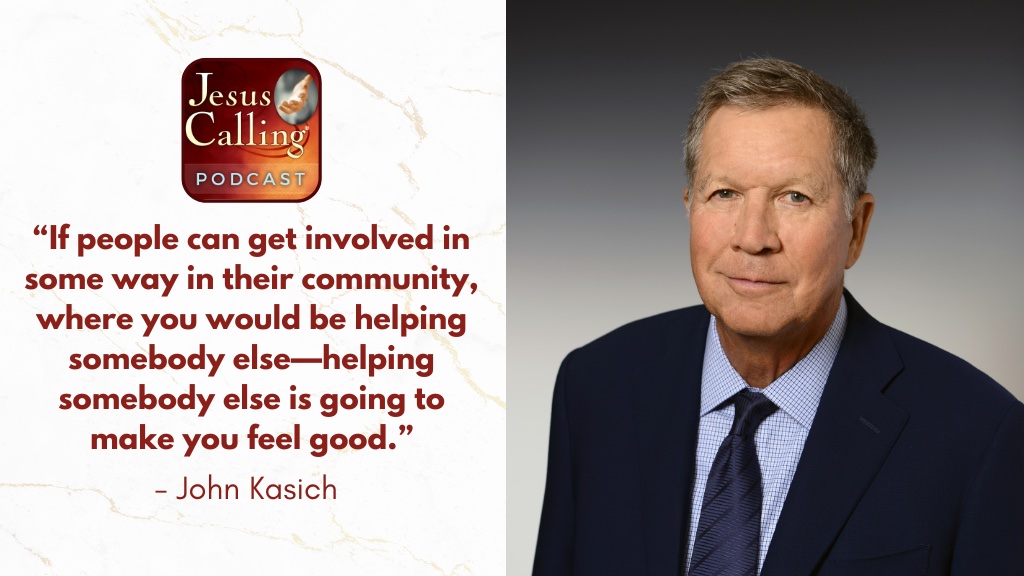
John Kasich: If people can get involved in some way in their community—for somebody that’s kind of struggling a little bit, think about what it is that you think would make you feel good, where you would be helping somebody else, because helping somebody else is going to make you feel good.
From Public Service to Personal Sacrifice: A Journey of Care with John Kasich & Marty Schreiber – Episode #486
Narrator: Welcome to the Jesus Calling Podcast. This week, we explore the profound impact of service and caretaking for others, as highlighted by our two inspiring guests, former governor and presidential candidate John Kasich, and former governor Marty Schreiber. Join us as they share their personal journeys and insights into how dedicating oneself to the well-being of others can transform lives, both for those who serve and those who receive care.
Let’s begin with John’s story.
John Kasich: My name is John Kasich, and I live in Ohio. I’m just doing my best to work my way through the world.
My mother and father worked. My father carried mail on his back and my mother did a stint in the post office in downtown Pittsburgh. They both had hearts—I’ll tell you one little story. We would spend a lot of time up at the schoolyard with me and my pals. There was some guy that came up there and he brought a little pony horse and we would pay him some money to get on the pony horse. My mother found out.and we went to the schoolyard. The ride was probably a nickel, and my mother gave him like two dimes or something like that. We were walking home, and I said, “Mom, you gave that guy a lot more money than it cost to ride on the pony.” She said, “Yes, Johnny, did you see his eye? Did you see how his eye was out of place? We have to treat people like that special.” I was probably ten years old, and I remember that story like it was yesterday. We grew up in a blue collar community where people kind of helped one another.
A Tragic Loss Brings New Perspective
My own story—my mother and father were killed by a drunk driver. It was one of the greatest fears I ever had—that they’d be killed in a traffic accident. This happened in 1987, and I don’t even know, after that happened, if I even believed in God, let alone believed God cared about me. And that started me on a thirty-eight year journey.
And so I’m a believer, at times having my doubts. Who doesn’t? I’ve concluded that He’s there and that He cares. It doesn’t mean things are easy. Life is short, but eternity lasts a long time. I think we just have to get it as right as we can here. All of us who go through trials and tribulations, which we all do in one way or another, at one time or another, we can hang in there. Even though very bad things can happen, there’s a higher power that cares about you and loves you even through difficult times.
“All of us who go through trials and tribulations, which we all do in one way or another,, we can hang in there. Even though very bad things can happen, there’s a higher power that cares about you and loves you even through difficult times.” – John Kasich
A Career in Public Service is Born
I was a Catholic as a boy. I became an altar boy when I was in the fourth grade, and then I became a commentator in ninth or tenth grade. So I had gotten used to having a microphone and speaking in front of people.
And then I graduated from high school and went to Ohio State, which is a very big school—60,000 [students] or whatever. I had to wait like a year before I could go to law school, and I ended up walking into the State House where I never thought I’d get a job. I got a job, and I went to work in the legislature. And then I quit my job and I ran, and I won in a big upset, and there I was. So it’s just sort of one thing led to another, one foot in front of the other, and one happenstance after another.

Everybody’s got their issues. Everybody’s got their problems. You know, when I ran for president, the people that I was meeting with, they did not really care about my position on issues. They really cared about that I cared about them. And so, all that kind of fits together.
“When I ran for president, the people that I was meeting with, they didn’t really care about my position on issues. They really cared about that I cared about them.” – John Kasich
Helping Others That Are Right Next Door

I do believe that we need some sort of a spiritual spark, rebirth, whatever in the country, because it’s so hard to get your voice above the din of the negativity sometimes. Let’s not get too cranked up about some media thing that’s on TV for thirty seconds. Who cares? Nobody cares. Get involved in your community, right? Do something. Go to the food bank. Think about what it is that you think would make you feel good, where you would be helping somebody else, because helping somebody else is going to make you feel good.
“Think about what it is that you think would make you feel good, where you would be helping somebody else, because helping somebody else is going to make you feel good.” – John Kasich
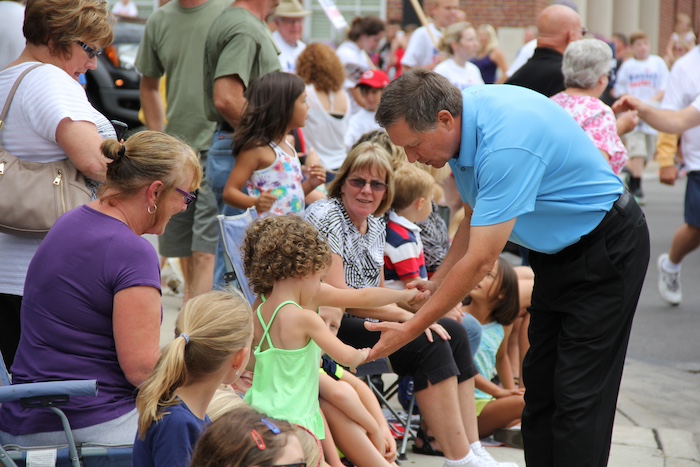
I want people when they go past a church or a synagogue or whatever to just stop for a second and think, I wonder what good is going on out of that place. And for those places that do a terrible job, I don’t care about that. But the ones that are truly dedicated, I think we need to be happy about that and optimistic about that.
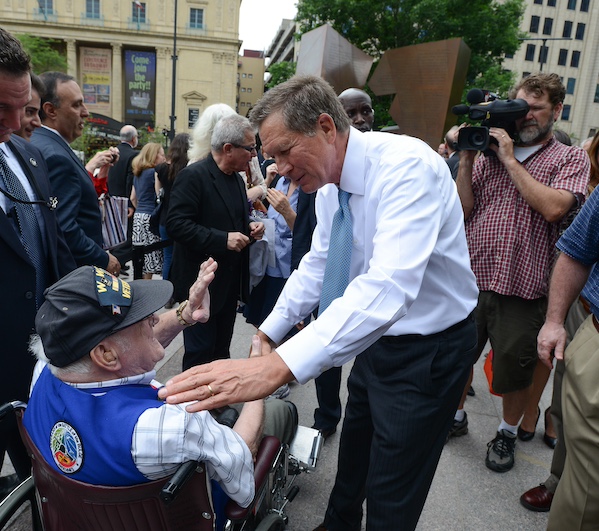
The institutions that our founders created protect us in many ways. And again, people are so focused on these things that are far away instead of focused on what’s happening right next door. But when we all think that we are all made in the image of God, it starts to melt us a little bit. It starts to put us together. Our heavenly Father knows about it. He loves us. He cares about us. We’re all sinners. We’re all screwballs, right? We’re all hypocrites. But if I have a sense that there is somebody there that loves me and cares about me, it’s going to make everything work out in the end. Because of my Father’s love for me, I believe fundamentally that we have a God who loves us, forgives us, gives us grace, gives us gifts, and encourages us. Faith, to me, is a gift. I think that’s something I can hold on to.
“People are so focused on these things that are far away instead of focused on what’s happening right next door. Because of my Father’s love for me, I believe fundamentally that we have a God who loves us, forgives us, gives us grace, gives us gifts, and encourages us. Faith, to me, is a gift. I think that’s something I can hold on to.” – John Kasich
Narrator: John’s latest book is Heaven Help Us: How Faith Communities Inspire Hope, Strengthen Neighborhoods, and Build the Future. You can find it wherever you buy books.
Stay tuned to Marty Schreiber’s story after a brief message.
Jesus Listens for Every Season!

Jesus Listens: Prayers for Every Season is a 365-day devotional prayer book by Sarah Young which offers topical prayers for issues like anxiety, grief, and gratitude and aims to help believers grow their prayer life through consistent, scripture-focused prayer.
Our next guest is Marty Schreiber, former governor of Wisconsin and devoted husband to his late wife, Elaine. Marty reflects on their life together—from high school sweethearts to partners in public service—and shares the deeply personal journey of caring for Elaine through her twenty-five-year battle with Alzheimer’s disease.
Marty Schreiber: I’m Marty Schreiber. For the past number of years, I have been a caregiver for my wife Elaine.
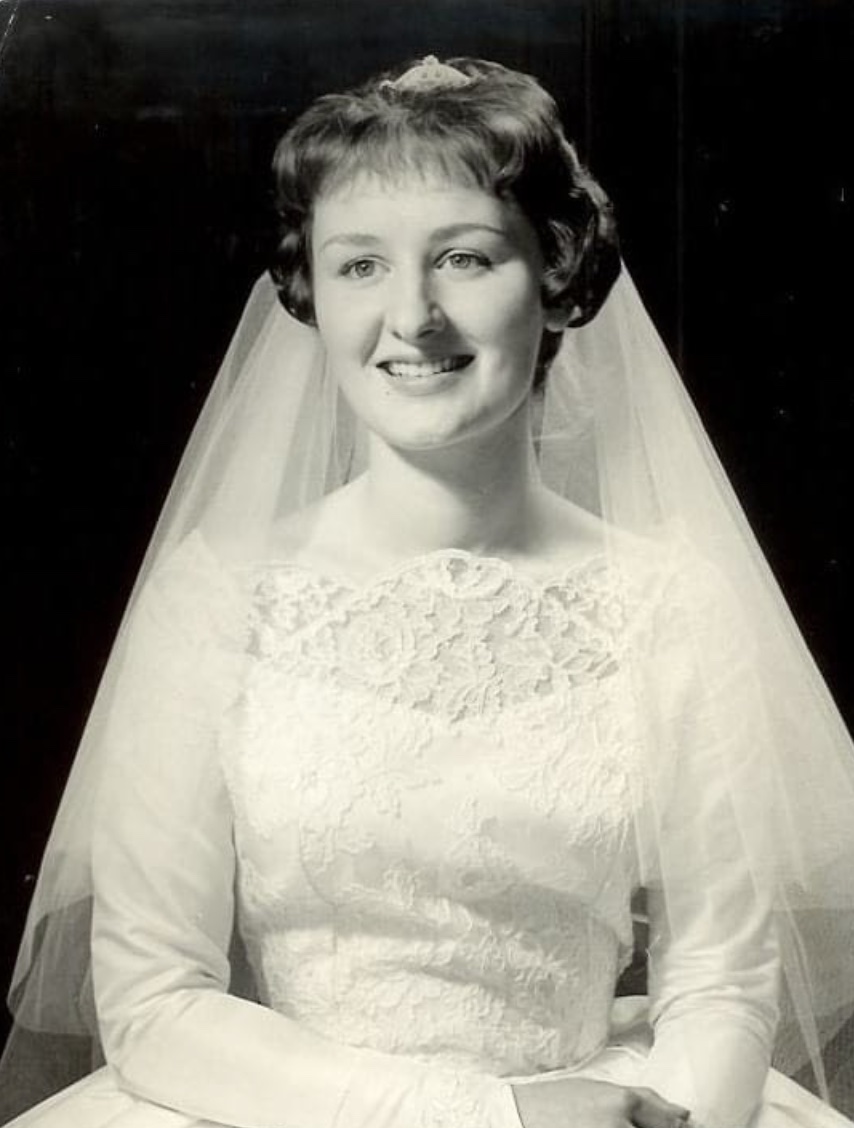
I married my high school sweetheart when we were of an early age of twenty-one. In that journey, she helped me become governor of Wisconsin, helped me be a publisher, helped me start my own business, and over the course of time, she at the age of sixty-three developed early onset dementia. And since that period of time some twenty-five years ago, her life has been my life.
In high school is where I met my wife Elaine—in Latin class—and she was the one I fell in love with. She sat next to me, and gosh, I remember her radiant smile, and I remember the twinkle in her eyes, and wow, I just thought, This was really some person that I wanted to get to know better.

Those early years of marriage were really quite involved with me finishing up my law degree, getting my doctorate of laws. It involved campaigning and serving in the Wisconsin state senate and raising two children right off the bat. She was my greatest political supporter. She would tell me, what she would ingrain in my mind is, “We may lose something, but we may never allow ourselves to feel defeated.”
“We may lose something, but we may never allow ourselves to feel defeated.” – Marty Schreiber
Elaine’s Alzheimer’s Journey
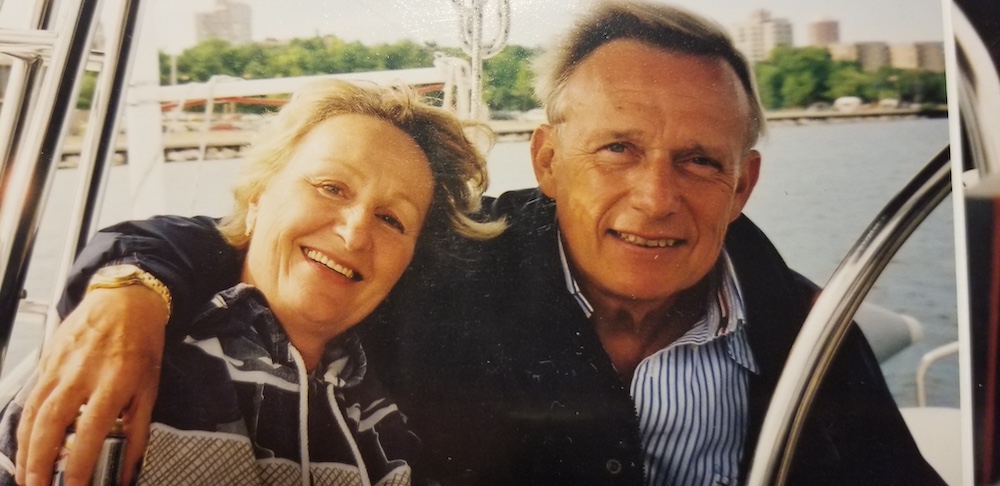
My wife was roughly sixty-three years of age when she began to get lost driving to and from places she had been going to and from for the last ten years. She would come up with stories about what happened, and it had no basis in reality. She was a great cook, and at some times, would mess up her recipe so badly that she would cry. Well, that was the beginning of what I would call the second Elaine.

When your loved one is diagnosed with Alzheimer’s, you automatically do not become a caregiver. What happens is you are still a husband, you’re still a loving, caring mate, a spouse. What happens is you don’t take off your spousal role and put on a caregiving role. You morph. A person morphs into being a caregiver, and because of that morphing process, the mind and the energy—the psychology—all of that has to change you as you morph from being a loving husband or spouse to being a caregiver. What you have to do is to embrace new ideas. You have to embrace new thinking.
“A person morphs into being a caregiver, and because of that morphing process, the mind and the energy—the psychology—all of that has to change you as you morph from being a loving husband or spouse to being a caregiver.” – Marty Schreiber
Going from spouse to caregiver is a morphing process. A spouse will say, “Elaine, it didn’t happen on a Thursday, it happened on a Friday.” A spouse will say, “It wasn’t the Smiths, it was the Joneses.” “Why are you asking me the same question over again for the tenth time?” “I told you ten times you’re leaving at eleven o’clock.” “Why did you put the car keys in the dishwasher?” Well, that’s the spouse talking. A caregiver understands the importance of joining the world of this person who now is. And a caregiver, as a spouse going into being a caregiver, has to let go of this person who once was so that we can now embrace the person who is now.
“A caregiver understands the importance of joining the world of this person who now is. And a caregiver has to let go of this person who once was so that we can now embrace the person who is now.” – Marty Schreiber
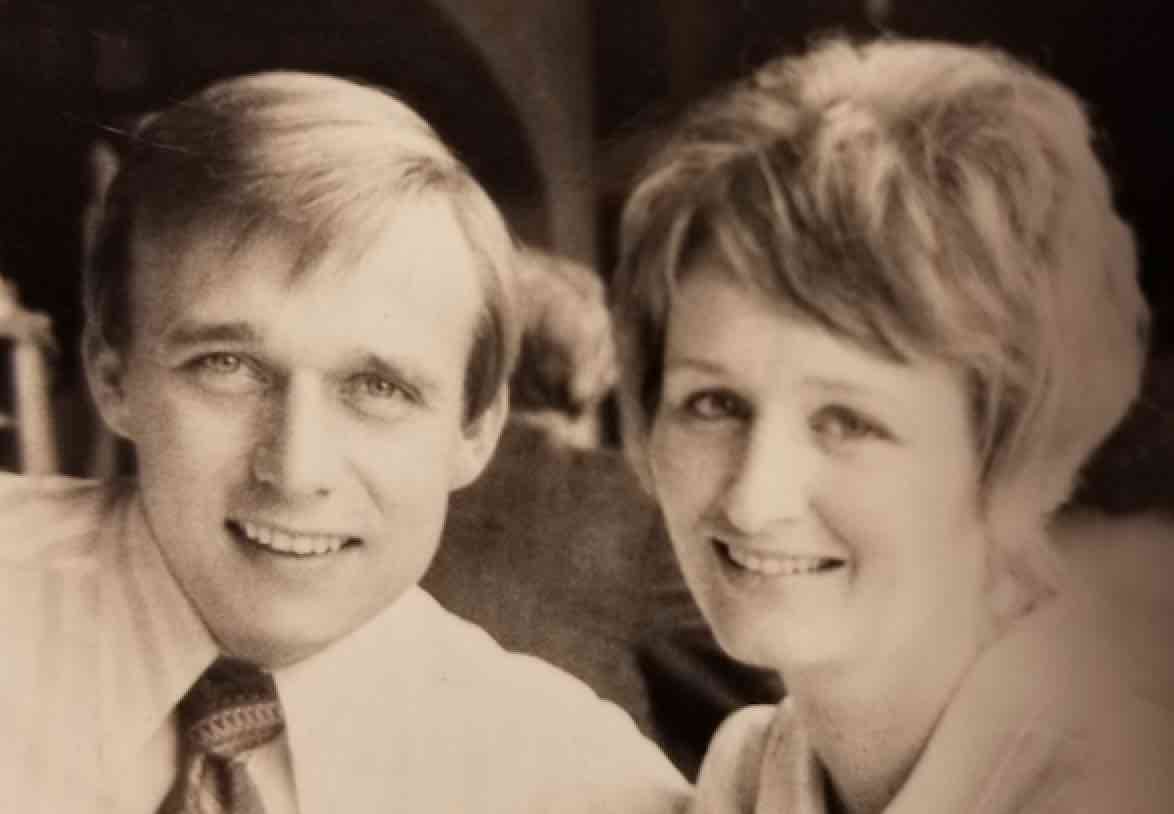
The very same person that I fell in love with when I was fourteen years of age and had four children and thirteen grandchildren and all ten great-grandchildren, that same person, that Elaine, changed into the second Elaine because of Alzheimer’s. And yes, it’s the same person, but a completely different life, a completely different being. And so I had a chance, really, by the grace of God, to love two Elaines and to take care of two Elaines and to repay the second Elaine for all of the great, wonderful things she did for me during our married life.
“I had a chance, really, by the grace of God, to love two Elaines and to take care of two Elaines and to repay the second Elaine for all of the great, wonderful things she did for me during our married life.” – Marty Schreiber
The Loneliness of Caregiving
Caregivers have many lonely moments, or at least I did. Some of the loneliest moments were when I was with Elaine. Even though I wasn’t alone, I was very lonely. I was able to go to counseling, and the counselor helped me better understand this disease. I can remember not wanting to ever put Elaine into assisted living memory care, and I told the counselor, “I can’t see putting Elaine into a nursing home.” The counselor said, “You’re not putting Elaine any place. You’re giving her an opportunity to be who she is now.”
My health was suffering. I was irrationally irritable, and I was really in no condition to take care of her. The lonely moment that came about was when I understood that my fight with Alzheimer’s was between me and Alzheimer’s. I felt like I had deserted Elaine because I had selfishly taken up my battle with Alzheimer’s.
When I took Elaine to assisted living memory care, I’m walking down the stairs of our condo, and Elaine is behind me. She leaves the door open, and I didn’t have the heart to ask her to close the door, because that would mean for sure that we are closing out that period of our life together. And so I was with her, but I felt so lonely. I felt so alone because it was just me and her. And it wasn’t just really her, it was someone different. It was a second Elaine.
The medical profession does not understand that when there is a diagnosis of Alzheimer’s, there are two patients. There is the person who is ill, and then also, there is the caregiver. Forty percent of all caregivers die before their loved one due to stress-related illness—forty percent. A caregiver versus a non-caregiver has a sixty percent higher mortality rate, and our medical profession doesn’t understand it.
“The medical profession does not understand that when there is a diagnosis of Alzheimer’s, there are two patients. There is the person who is ill, and then also, there is the caregiver.” – Marty Schreiber
So way back twenty-five years ago when Elaine was first diagnosed with Alzheimer’s, Alzheimer’s could not be cured or prevented. Today, in this year of 2025, Alzheimer’s still cannot be cured or prevented. When we got that diagnosis, that certainly was hopeless, Elaine makes sure I understand, “We may lose, but we can never allow ourselves to feel defeated.”
So what are we going to do? Well, we’re not going to give up. What we are going to do is understand there is something very special that we can have as a goal that’s going to make the difference in the life of my loved ones and that is to help them live their best life possible—a realizable goal. That is the kind of thing we can look back on when our loved one completes their journey. We can look back and see I know I couldn’t fight this disease because it is impossible to fight it, but I do know that I could give my wife moments of joy. I do know that I could join her world and give her more comfort and reduce her anxiety. I do know that I helped her have a better life. And so there’s a lot of comfort that we can take in that.
“I know I couldn’t fight this disease because it is impossible to fight it, but I do know that I could give my wife moments of joy. I do know that I helped her have a better life. And so there’s a lot of comfort that we can take in that.” – Marty Schreiber
Who Do Caregivers Turn To When They Need Care?
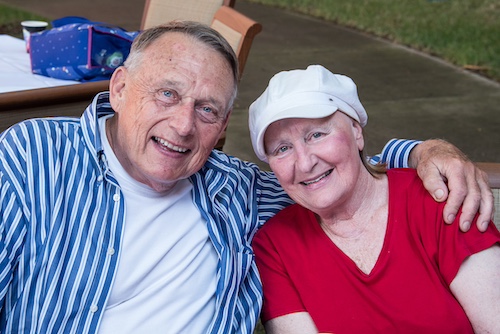
We’ve got to do a better job helping people understand this disease, but it’s also not very well understood by friends and neighbors of many years. But it is so very, very, important then that we work as we best can to join their world. It’s in joining their world that we can help them live their best life possible.
Our friends and neighbors don’t know what to say or do, so they stay away. So now the caregiver is not only facing this daunting challenge in this prognosis but he also begins to feel abandoned and deserted by friends of twenty-five, thirty, forty years, again, not because the friends are mean, not because they’re trying to be harmful, but they simply just don’t know what to do.
The role of a caregiver becomes extremely lonely over the period of time. Sometimes because the caregiver does not understand to ask for help means you’re not giving up. Sometimes the caregiver simply does not want to share that information with other people. Well, that information should be shared with other people—friends and neighbors and relatives—so that they in turn can become supportive, or at least aware.
If you are a friend or a relative of a caregiver, as someone who’s taking care of their loved one on the Alzheimer’s journey, one of the most important things you can do is to simply acknowledge that you understand what a challenge it is to be a caregiver. That is such a relief to me. When people could understand and say, “Yes, Marty, we understand what you’re going through and we understand how difficult it is.” So that’s point number one. Then next, many people say, meaning well, “Okay, well, if you need any help, you call me.” Caregivers don’t do that for some reason. Maybe spouses do, but caregivers don’t ask for help.
“If you are a friend or a relative of a caregiver, as someone who’s taking care of their loved one on the Alzheimer’s journey, one of the most important things you can do is to simply acknowledge that you understand what a challenge it is to be a caregiver.” – Marty Schreiber
Specifics—“I’m going to come over at such and such a time and cut the grass.” Or, “I’m going to be doing grocery shopping, give me the list.” Or, “I’m going to come over and visit and stay with your loved one for a little bit while you go for a walk and get some respite.” In other words, very specific things that can be done.
We have to be open in our loneliness. We have to be open and recognize that there are going to be situations around us which can be very helpful in giving us the strength and the understanding and to also help eliminate some of that loneliness. It could come about from a friendly cashier at the grocery store, or it could come about because of some little child looking at you with a smile on their face.
The point of the matter is that we’re in this world together, and sometimes, there are going to be situations where an individual needs some special help, and sometimes, where a person should acknowledge that they need special help. To not get it means you’re not only harming the life of the person with Alzheimer’s, but you’re also harming the life of the caregiver. The caregiver’s life is not just exclusive for caregiving, it’s also as a parent, as a grandparent, as a friend, and as a neighbor.
Grieving the Loss Before the Loss
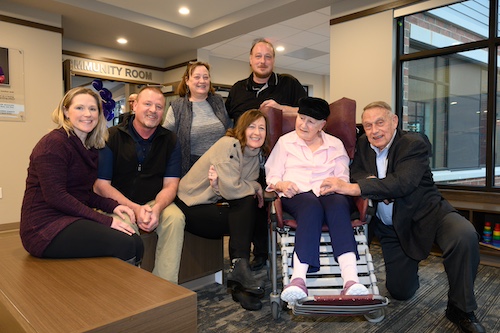
What happens in this process is that you see your wife, your loved one, leave you a little bit every day. They’ll get to the point where they no longer can execute any bodily function, where they’re simply just not aware, and where their life is just so entwined with their own being that there is no recognition by them of the outside world. And so you’re going through that experience.
I had a friend once who was retired and he was living a good life. He died of a massive heart attack at a snap of a finger. There was a funeral, people came by to express their condolences, and there was closure. There was closure. As tragic as it was, there was closure. A caregiver? Their journey as a caregiver is grieving, and we don’t acknowledge that. We don’t acknowledge that grieving is a part of what our experience is, because well, we just don’t. But we are grieving because we see our loved one pass over every day. When Elaine passed away, in a way, it was a relief. I could not ask her to stay in this world one more minute based on her situation. And so from that standpoint, it was a relief. But it also was so painful to think that this woman who I’ve been married to for over sixty years was now gone. But then to understand that, I know she’s going to heaven. But then also to think and understand that now there is closure.
Elaine can go on to a different life. And also, then a caregiver can go on to a different life as well. So I was then finally able, at the time of her passing, to get closure—to fully come to the grief of it all and to let my emotions come out. And just have these moments—acknowledging the passing, the loss of this very wonderful human being. And so, since her passing, my life really has become devoted to helping caregivers learn, cope, and survive—bringing a passion to if I can help someone on this journey, that’s what I want to do. I know how hard and how difficult it is, but I also want to do this as a tribute to Elaine.
It’s a difficult transition, there’s no question about it. You enter a dark room and you just kinda have to feel your way along and try to identify a specific guidepost, specific things that are going to help you on this journey to deal with this grief, to deal with this new world.
“It’s a difficult transition, there’s no question about it. You enter a dark room and you just kinda have to feel your way along and try to identify a specific guidepost, specific things that are going to help you on this journey to deal with this grief, to deal with this new world.” – Marty Schreiber
And also by the grace of God, you can find things that are going to open up new avenues in this world as a tribute to the one who passed. I think about the prayer and how important it is what I learned early on. The simple cliche is, Why worry when you can pray? And gosh, it sure has so many times saved me a bunch of restless, horrible, sleepless, nights by saying, “Okay, I’m not going to worry. Here it is, God. I need You to help.” And to know that there is this Friend who is going to be with you all the time, to know that He’s going to be watching and guiding you and protecting you no matter what you do, and always [be] someone who you can turn to when things are just not only absolutely hopeless, but just completely hopeless and impossible. What a comfort that was.
I’ll be reading from Jesus Listens, July 4th:
Invincible Jesus,
Because of Your amazing sacrifice for me, I want to serve You with every fiber of my being. I know that my service is woefully inadequate. Nonetheless, when I yield myself to Your will, You bless me with Joy. Because You are perfect in all Your ways, as Your Word teaches, where the Spirit of the Lord is, there is freedom. I rejoice in the freedom I have found in You, Jesus. And I surrender gladly to Your conquering Love!
In Your powerful, loving Name,
Amen
Narrator: To learn more about Marty Schreiber, visit www.mytwoelaines.com, and be sure to check out his new book, My Two Elaines: Learning, Coping, and Surviving as an Alzheimer’s Caregiver, at your favorite retailer.
If you’d like to hear more stories about serving others with a heart of caring, check out our interview with Justin Knoop.
Next week: Cristina Baker

Next time on the Jesus Calling Podcast, we will talk with Cristina Baker, a speaker, author, and digital creator. After growing up in a tumultuous family environment, experiencing homelessness & addiction, and jail time, Cristina bravely rebuilt her life after someone she barely knew encouraged her to attend a prayer meeting.
Christina Baker: There’s no better place to be than when your back is up against the wall and you have no other option but God. He will take that night season that was meant to destroy you—and even take your life—and turn it into something that you could have never thought or imagined. The key is not giving up.


